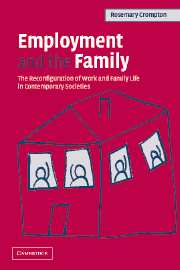Book contents
- Frontmatter
- Contents
- Preface
- 1 Understanding change in employment, family and gender relations
- 2 Caring and working
- 3 Women, men, organisations and careers
- 4 Work–life articulation, working hours and work–life policies
- 5 States, families and work–life articulation
- 6 Households, domestic work, market work and happiness
- 7 Class, family choices and women's employment
- 8 Conclusions
- Appendix A Additional ISSP Family 2002 questions
- Appendix B Joseph Rowntree Foundation (JRF) interviewees cited
- Bibliography
- Index
8 - Conclusions
Published online by Cambridge University Press: 22 September 2009
- Frontmatter
- Contents
- Preface
- 1 Understanding change in employment, family and gender relations
- 2 Caring and working
- 3 Women, men, organisations and careers
- 4 Work–life articulation, working hours and work–life policies
- 5 States, families and work–life articulation
- 6 Households, domestic work, market work and happiness
- 7 Class, family choices and women's employment
- 8 Conclusions
- Appendix A Additional ISSP Family 2002 questions
- Appendix B Joseph Rowntree Foundation (JRF) interviewees cited
- Bibliography
- Index
Summary
The major aim of this book has been to examine the changes in the manner of the articulation of employment and the family in Western societies, together with its consequences. Many factors have contributed to these changes, but one of the most important has been the securing, by women in Western-influenced societies, of the recognition of their right to equality with men. Furthermore, the employment of women, particularly mothers, is now recognised as a ‘fact of modern life’.
Conceptualising change and development in gendered work
As many other commentators have emphasised, the ‘separate spheres’ of public and private, of employment and family, are not in reality separate but are, rather, interdependent (Marshall 1994). Feminists have long argued that the labour of caring is necessary to human functioning and should therefore be regarded as essential ‘work’ for human societies, and paid employees would not be able to function as such were it not for the ‘work’ carried out within their households. One useful way in which this interdependence between market and family work can be grasped is via Glucksmann's conceptual device of the ‘total social organisation of labour’ (TSOL), which we have drawn upon in earlier chapters of this book. This is: ‘the manner by which all the labour in a particular society is divided up between and allocated to different structures, institutions, and activities … the social division of all of the labour undertaken in a given society between institutional spheres’ (1995: 67).
- Type
- Chapter
- Information
- Employment and the FamilyThe Reconfiguration of Work and Family Life in Contemporary Societies, pp. 189 - 218Publisher: Cambridge University PressPrint publication year: 2006

